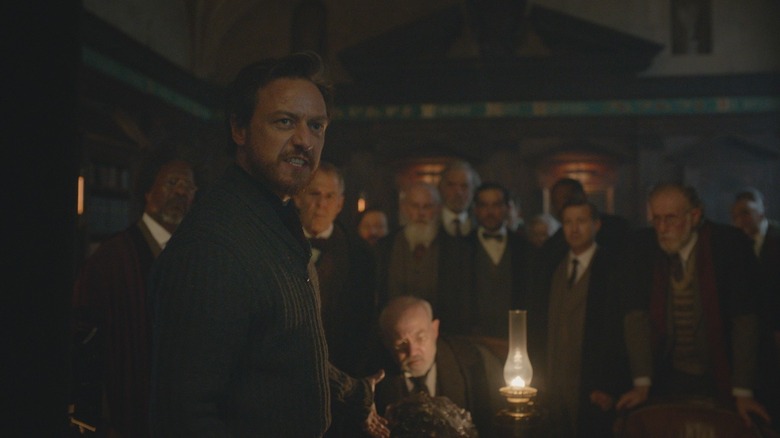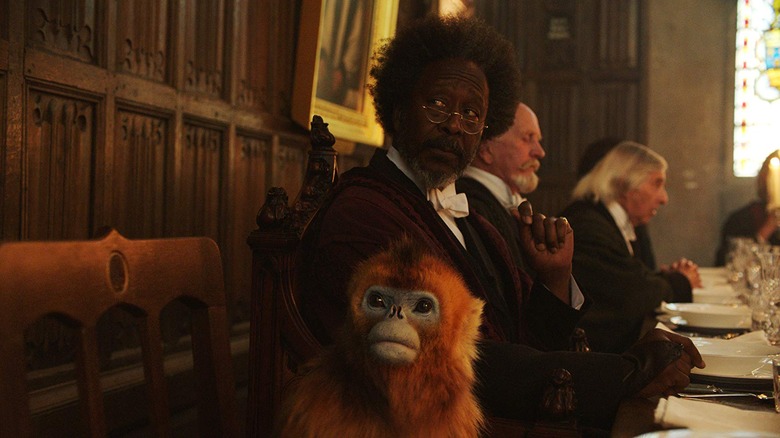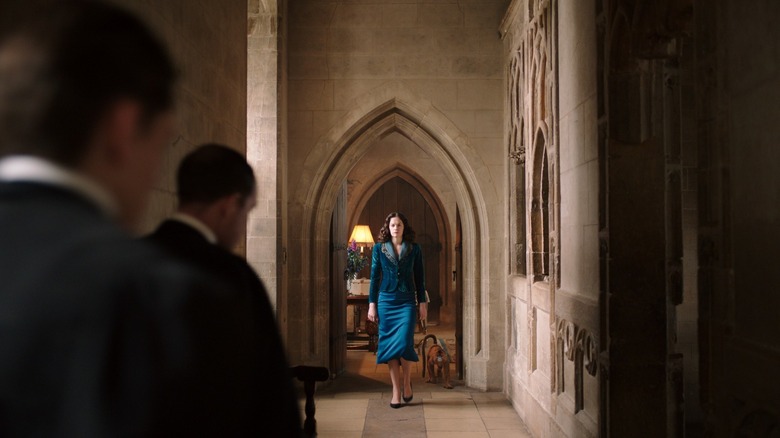'His Dark Materials' Kicks Off With A Dark, Mature Version Of "Lyra's Jordan"
His Dark Materials wants you to take it seriously now. And with the first episode of HBO and BBC's TV series adaptation of Philip Pullman's beloved fantasy adventure novels, it achieves just that — albeit to both positive and negative effects.
Long tucked away in the children's sections of libraries and bookstores, the His Dark Materials novels have legions of fans who have desperately wished for Pullman's twist on Milton's Paradise Lost to be taken seriously as a smart, even times philosophical, fantasy adventure story. In its first episode, "Lyra's Jordan," it's clear that His Dark Materials TV series is most definitely "made for adults." Prestige director Tom Hooper bestows upon the series a muted color palette and lots of shadowy corners for the whispered schemes to take place, while Jack Thorne's script crafts a vast web of intersecting storylines that are much more complicated than that of the book's original adventure story revolving around the bull-headed orphan Lyra Belacqua (Dafne Keen) on a quest to rescue her friend. But by shifting the focus away from Keen's fiery little heroine, we never get to really know "Lyra's Jordan" or the rich, vibrant world that Pullman created — the first episode is a little too heavy on table-setting and a little too fixated on those shadowy corners.
A Great Flood
After a somber text introduction explaining the "alternate reality" that the series takes place in — in which humans' souls walk beside them as animal companions known as daemons and an oppressive Magisterium "rules" the world — His Dark Materials dives straight into the action. Quite literally: The opening scene follows James McAvoy's brusque Lord Asriel landing a helicopter in a flooded Oxford, England, carrying a baby in his arms. Wading through chest-deep water, Asriel hammers on the wooden door of a historical-looking stone building, which is opened by Clarke Peters' Master of Jordan College. Demanding that Jordan College give them "scholastic sanctuary," Asriel hands the baby, Lyra, and her daemon Pantalaimon to the befuddled Master, with orders to keep them safe.
It's with this opening scene that His Dark Materials establishes right off the bat that it wants to be a mature series for adults. The scene doesn't come from Pullman's original trilogy, but from his still-ongoing companion trilogy The Book of Dust — the first of which novels was set soon after Lyra's birth as several shadowy groups clashed over the prophesied child. By opening with a scene from The Book of Dust (and by subtly positioning McAvoy's dashing Lord Asriel as a typical fantasy hero), His Dark Materials essentially declares that the series will be bigger than Lyra and her childish antics — which is kind of a shame.
The energy of Pullman's 1995 novel The Golden Compass (originally titled Northern Lights) stems from Lyra's free-spirited, slightly mischievous, character who dreams of leaving her small world to go on great adventures north. Keen is great at playing the little rascal with a streak of morbidity, introduced as she's running around the respectable halls of Jordan College with her servant friend Roger (Lewin Lloyd). Lyra treats the marbled halls of the college as her playground, leaping around rooftops and dragging her poor friend around to the crypts, where they ponder growing up (in this world, marked when a person's daemon settles into one form) and drink stolen wine. Later, a prank in which she outsmarts her tutor the Librarian (Ian Gelder) plays out delightfully, painting Lyra s a lovable scamp despite Keen's somewhat halting line delivery that feels like the Logan actress is still getting used to the role.
Still, Lyra feels like a bit player in this episode, which is understandably packed with exposition. Lord Asriel, who in the book barely appeared more than a handful of times, takes the forefront of this episode, with lots of emphasis given to his mysterious expedition north. We cut from Lyra straight to a scene of Asriel taking pictures of the Northern Lights from a cliff in the middle of a wintry blizzard, pictures that will provide the "evidence" he needs to convince the scholars of Jordan to give him funding. That and a little "friend" in the form of a frozen head that he packs for the journey back to Oxford.
Fireside Intrigue
It's a good 15 minutes of the episode before the plot really begins with Asriel's arrival in Oxford. Excited at her adventurer uncle's return to Jordan, Lyra escapes her lessons to sneak into the Retiring Room where she spots the Master sneaking poison into Asriel's wine. Knocking the glass out of Asriel's hands, Lyra frantically explains what she saw and gets recruited by Asriel to spy on the Master during his presentation to the scholars.
Lyra watches Asriel's commanding presentation from behind a grate and learns that her uncle is searching for something called "Dust," a newly-discovered particle that appears to only be attracted to adults. The unnerved scholars grumble about heresy, but are quickly turned around when Asriel pulls out his "friend," the frozen head of Jordan scholar Stanislaus Grumman, who had disappeared on an expedition north. Persuading the scholars that Grumman's expedition was tied to "Dust," Asriel receives the funding while intensifying Lyra's eagerness to journey north with him. But in a quiet moment between the two of them after Asriel has carried a sleeping Lyra up to her bed — which, in a nice touch, is surrounded by postcards from him and childishly drawn pictures of the north — he refuses her pleas to take her north with him.
The sudden introduction of the Gyptians, a nomadic river-faring people who are considered societal outcasts, is a little jarring and the show's weakest display of its Game of Thrones influences. Those Game of Thrones-ian aspects — of separating its characters into thinly connected storylines that run in parallel to each other — which I praised my spoiler-free review, make it harder to empathize with a whole new cast of characters who we must now care about when one of their children is mysteriously kidnapped. It's here that the parts of Lyra's story that the series excised — the "mud wars" between Lyra and the Gyptian children, the whispered children's stories of "Gobblers" who kidnapped wayward kids, the reluctant fondness with which the townspeople and Jordan scholars treated Lyra — are keenly felt. Instead, we're introduced to the Gyptians through a spiritual ritual as the community celebrates the settling of teenager Tony Costa's (Daniel Frogson) daemon, right before his timid younger brother Billy Costa (Tyler Howitt) is kidnapped.
Billy Costa's kidnapping is the first sign of trouble we see in this world, despite the many characters' insistence that stories of the child-kidnapping "Gobblers" have been around long enough to become children's stories. (When? Where?) The Gyptian elders, Farder Coram (James Cosmo, all warm gravitas) and the Western King John Faa (an incredibly cool Lucian Msamati), convene after searches for Billy have turned up nothing, confirming that the Gobblers are real and setting the plot in motion.
The episode suffers a bit from leaping too far ahead with its Book of Dust nods and late-book foreshadowing, sacrificing the world-building it could have accomplished by keeping us in Lyra's perspective. In having their eye on the big picture they lose some of the magic of the details. The rich world feels so much smaller because we don't get the vibrant town life of Lyra and her rivalry with the Oxford children. She is instead incredibly isolated — only fussed over by the Master and the Librarian, who discuss in tremulous whispers by fireside how they can protect her from a prophecy predicting of a "great betrayal" — and her own struggles feel miles away from the Gytpians, though in the book they are tightly bound together.
The Wheels Are Turning
After many whispered hints of heresy and the Magisterium's wrath over "Dust," we get introduced to the oppressive religious institution in perhaps one of the episode's most striking shots yet. The Magisterium headquarters looks like an austere and imposing sci-fi stadium, with a giant symbol overlooking the two figures who discuss Lord Asriel's heretical quest. The scheming Lord Boreal (Ariyon Bakare) informs the Magisterium's president of the Consistorial Court of Discipline Father McPhail (Will Keen, Dafne Keen's father) of Asriel's goal with "Dust," and is sent on a mission to stop his expedition by any means — without informing "her."
This cuts smoothly to a fantastic introduction to Ruth Wilson's power-hungry socialite Mrs. Coulter. Throwing open the doors in Jordan College, Mrs. Coulter struts through the hall as every man she passes turns to stare. She makes her way to the head table, where a bored Lyra sits, still stinging from being rudely left behind by Lord Asriel. Lyra's eyes light up at the appearance of the charming, sophisticated woman who looks unlike any person she's seen before and Wilson plays up the charms. She and Lyra instantly hit it off, with Lyra gasping at each of Mrs. Coulter's exciting stories and agreeing quickly when Mrs. Coulter asks that she joins her north as her assistant. It's amazing how instantly Wilson takes control of the situation through a few simple microexpressions and casual gestures — her subtle lip bite when Roger calls Lyra's name, her face falling slightly when Lyra requests that Roger join them on their journey north, her timid happiness when Lyra hugs her — are all magnificent. In just 10 minutes of screentime, Wilson nearly steals the entire show.
Wilson is so tremendous that it's easy to almost miss the quick succession of plot that happens right after. Roger disappears when the same fox with the glowing eyes that had lured Billy Costa appears behind him, and Lyra soon discovers his absence when she is woken surreptitiously by the Librarian instead of her friend's customary greeting of breakfast. The unusually jittery Librarian takes her to meet secretly with the Master, who gifts her with an alethiometer, a rare compass-like device that has the ability to tell the truth. Keep the alethiometer from everyone, the Master tells Lyra. "Even Mrs. Coulter," he warns ominously. Confused by the Master's gift and the disappearance of her friend, Lyra sees no choice but to take up the assistanceship with Mrs. Coulter, after the socialite slyly assures her that she can help find her friend. At the last minute, Lyra boards the departing airship and settles in to finally leave her small world of Jordan College.
Subtle Sidenotes



